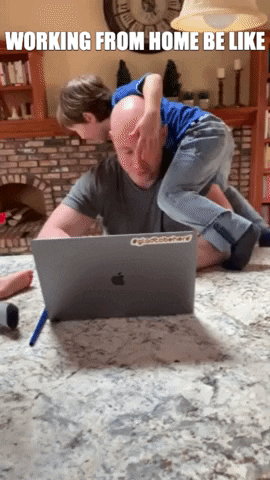Hello, and welcome back to the Bright Morning newsletter. This week, we are delighted to announce that, for the first time in a while, it has been a slow week for news. This might sound like a perverse thing for us to celebrate (given that our entire project is dependent upon current events), but in an age where there is so much useless noise from the culture wars, it is refreshing to not have to respond to the latest cancelation, uncontroversial statement, or unprovable assertion. Instead, we will take advantage of this opportunity and take a deeper look into some of the unintended (but not surprising) consequences of COVID.
As always, if you are enjoying our work each week, please consider sharing our work with friends, family, peers, and detractors.
| PUBLIC HEALTH
The changing attitudes towards working-from-home
Last week, an article from The Globe and Mail brought attention to the obvious, but often ignored, consequence that lockdowns have on mental health. If we wind back the clock by one year, we will remember the internet exploding with stories and images of people who were enjoying the transition to working from home. For most people, working from home was a blessing in disguise because it offered us more time with family, it reduced the costs of commuting, and of course, we could do our jobs without wearing pants (so long as we did not pull a Jeffrey Toobin 🍆 by broadcasting our “alone time” during a Zoom meeting). However, we are now more than one year into lockdowns, and it seems that most people have moved from the “honeymoon” stage of their work-from-home relationships to the “desperate to break-up” stage. It turns out that staying in bed, unshowered, and staring at a computer screen all day is actually quite awful for our mental well-being (no way!).
One of the key arguments presented is that deteriorating mental health in work-from-home professionals is “an unexpected development.” But is it really that unexpected? Readers might recall our article from January, when we spoke about Ontario MPP Roman Baber being ejected from the Progressive Conservative Caucus for raising these very issues in an open letter to Premier Doug Ford. Baber spoke about the catastrophic toll that lockdowns were having on mental health, but Ford dismissed this concern and instead excommunicated Baber from the PC Party for being “ideological.” Nonetheless, the article moves on to state that “white collar workers are precisely the people who were expected to be doing the best. For the most part, their jobs have been protected from the economic devastation of the past year.”
Indeed, white collar workers have had the benefit of job security, but is job security alone enough to provide job satisfaction and mental well-being? Evidently not. In addition to research showing that many people are working longer hours (in some cases, 2 to 2.5 hours more per day), there are anecdotes from people who are experiencing an increase in stress, anxiety, depression, and fatigue from working-from-home. Some examples include a middle-aged father who started losing his eyebrows and an executive who refused a promotion because she could not bear the thought of having to take on more work. One reason for this increase in stress is that workers have lost their principle of comparison. The article states that “working from home has made it much harder for people to tell if they’re taking on too much, or not enough, compared with their coworkers. In the office, they might grab a tea with a colleague after finishing a presentation deck. But now they’re sitting alone in their house, possibly feeling guilty, so they fill the time with more work.” In other words, work-from-home has created a general feeling of chaos or loss of control, where workers feel pressured to do more than what is manageable because they cannot tell if their efforts are too little or too much.
One problem that the article does not explicitly cite, however, is loneliness. In a recent book called The Lonely Century, author Noreena Hertz analyzes what she describes as an “epidemic of loneliness.” This epidemic has been exacerbated by COVID because individuals who were already experiencing isolation are now feeling more isolated because they can no longer engage in the mundane - but often taken for granted - social interactions at work, such as conversations at the water cooler or the coffee machine. Hertz also argues that loneliness in a workplace setting reduces feelings of group cohesion, and so individuals become alienated from their jobs and organizations, therefore negatively impacting mental health and workplace productivity.
Based on these reports, it would not be unreasonable to conclude that working-from-home is not all that it is cracked up to be. It can have its uses, but when it becomes the default method of work, it has some rather detrimental consequences for physical and mental health. But is this not obvious? Why are we even talking about it? Well, as we alluded to earlier, these problems have been ignored by leaders at both the federal and provincial level in Canada; they have consistently treated COVID as a univariate problem, where the only thing that matters, in their eyes, is how many new cases are reported each day. This tunnel vision, as we have seen (and will see), has introduced a whole host of other problems. However, these are problems that leaders can no longer turn a blind eye to. As the article suggests, “working from home is causing breakdowns. Ignoring the problem and blaming the pandemic is no longer an option.” Therefore, we regard these reports as a sign of progress because it signifies a growing consensus in legacy media outlets that the shelf life for our current COVID management strategy (i.e. lockdowns) has expired.
| PUBLIC EDUCATION
Zoom School: a permanent trend?
If working-from-home is creating more problems than it solves for adults, then it stands to reason that children who “learn-from-home” would experience similar (or worse) negative health consequences. However, these consequences continue to be ignored - and as we are about to see, fueled - by the Province of Ontario.
Last week, a Global News article reported that the Ontario Ministry of Education is considering making “remote learning” a permanent feature of the provincial education system. One document read that “if introduced and passed, beginning in September, 2021, parents would continue to have the ability to enroll their child in full-time synchronous remote learning if they choose going forward. School boards would also be required to provide students with remote learning on snow days in the event of an emergency that results in a school closure.” There are a number of red flags that could appear.
First and foremost, this decision represents, yet again, another shifting of the goal posts. The Elementary Teachers’ Federation of Ontario (ETFO) was the first to voice opposition, stating that “the move to virtual learning was never intended to be permanent; it was a temporary measure intended to deliver emergency instruction during a global health crisis.” We have our problems with public sector unions (specifically because of their shift towards political activism and lobbying), but we are in agreement here. It is unethical for the Minister of Education, Stephen Lecce, to smuggle in such drastic changes to learning structures under the guise of “safety,” when the likely result would simply be a reduction in learning quality.
Like working-from-home, remote learning can have its uses, but it should only be integrated more broadly into the education system with extreme caution. Otherwise, the quality of education that children receive would be jeopardized, as there are risks for students and teachers. According to the American Psychological Association, there are both “learning losses and teacher burnout.” It is unfair for children to be placed in front of a computer screen for 8 hours per day, and it is equally unfair to have teachers serve as pseudo-social workers by requiring them to screen for changes in students’ mental well-being over a Zoom call (as they are often asked to do). Remote learning should instead be viewed as a supplement, rather than a primary avenue for learning. To believe that remote learning is as effective as in-person instruction would be as erroneous as believing that watching fitness videos on YouTube will make you lose weight. Students need practice, and this practice is best experienced in the classroom. Furthermore, we would be surprised if we found any parents or teachers who agreed that children, overall, had a better experience with the shift to online learning.
The prospective changes to the education system also raise another issue that is glaring everyone in the face: the importance of social interaction. As we saw with the reports on working-from-home, in-person interactions at work are important for maintaining mental and physical well-being as they help decrease feelings of loneliness and increase feelings of group cohesion. In other words, the function of a job is not to simply provide us with financial or material resources, but rather to help us integrate into a social institution where we connect with others. As Jordan Peterson describes in his new book, Beyond Order, social institutions help us maintain sanity. If this is true for adults, then it is even more true for children. Thus, the function of school is not exclusively for students to memorize information, but rather to give children an environment in which they learn to interact. These in-person interactions at school are how children develop important life skills, such as learning reciprocity (or learning to engage in fair play); how to stand up to bullies; how to communicate with peers; and how to speak to adults or individuals in positions of authority. If children continue to be deprived of these life lessons because of the insistence on remote learning under the guise of “safety,” then education will be the least of their concerns when they grow up. Instead, children might end up as something akin to a more sociopathic version of Brendan Fraser’s character from Blast From the Past.
| EXTRAS
Further Listening 🎧
This week, we encourage you to listen to Noreena Hertz as she describes the aforementioned book, The Lonely Century. Full disclosure: Hertz needlessly politicizes her work in this interview by suggesting that loneliness is a major predictor of populism. This conclusion is both patronizing and out-of-touch because it ignores the very real and valid arguments for populism as a political principle, such as the working and middle classes’ wholesale rejection of identity politics and monopolistic institutions. It is also a one-sided conclusion because the exact same argument can be used to interpret radical leftists’ support for authoritarian social policies and speech codes. Nonetheless, Hertz discusses some interesting insights and research on what loneliness can do to individuals, such as increasing the risk of physical and mental illness. It is worth a listen, so long as you can take off your partisan hats for an hour.
Is There A Loneliness Epidemic? - Noreena Hertz | Modern Wisdom Podcast 266
We will be back next week with more topical news stories. We hope that you found this slower pace acceptable for the time-being. Thank you for your time, and we will see you next week.















